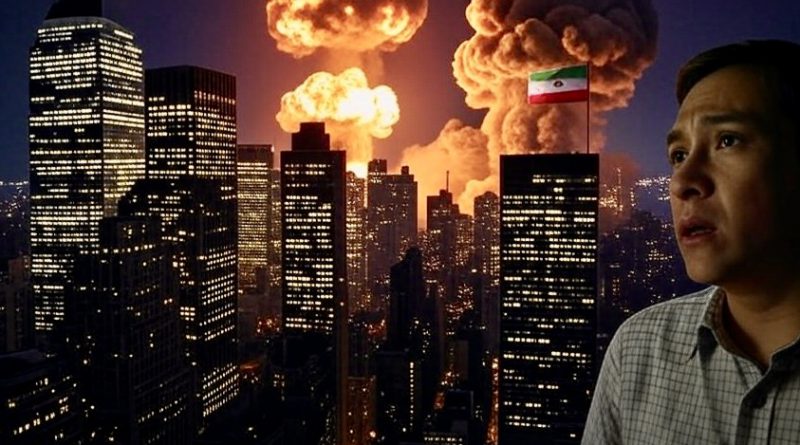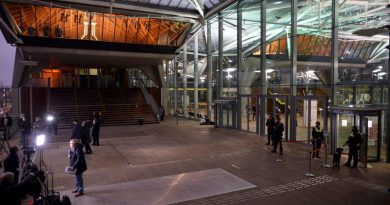OPINION: The Morning That Changed the World—What If Iran Armed Its Proxies With Nukes?
A nation that simultaneously hosts Al-Qaeda, sponsors Hezbollah, and floods the region with ballistic missiles is knocking on the nuclear door. This isn’t paranoia.
It began like any other Tuesday in New York City. Office workers clutching their Starbucks cups, subways packed with commuters, hot dog carts rolling open. Downtown Manhattan was alive with the pulse of a global metropolis.
And then – impact. A sudden, blinding flash. A thunderous shockwave that rippled through the Financial District. Glass shatters. Skyscrapers buckle. Heat, fire, and smoke engulf the city’s core. In the span of seconds, hundreds of thousands lie dead or dying. The heart of global finance has just suffered the unthinkable: a nuclear detonation on American soil.
Two hours later, the world reels in horror .. and then comes the voice.
From Yemen, the leader of Al-Qaeda claims responsibility: “We have avenged Osama bin Laden, 17 years to the day since his death.” The language is familiar, fanatical, self-righteous, and soaked in blood.
But the bomb wasn’t a missile dropped from a plane. It was a compact, modified nuclear device designed for ground-level devastation. The kind of weapon that slips through borders. The kind of weapon small enough to be trafficked, not deployed by a state, but handed off to a proxy.
Let’s be clear: this hypothetical scenario isn’t a scene from a dystopian thriller. It’s a logical outcome of a world where we allow the Islamic Republic of Iran – arguably the most prolific state sponsor of terrorism on earth – to acquire nuclear weapons.
The Real Threat: Nuclear Terror by Proxy
For over 40 years, Iran’s regime has constructed a vast transnational web of extremist militias and terrorist proxies. Hezbollah in Lebanon. The Houthis in Yemen. Hamas in Gaza. Dozens of Iraqi militias. Thousands of mercenary fighters in Syria drawn from Afghan and Pakistani Shia brigades like Fatemiyoun and Zainabiyoun. Even elements of Al-Qaeda – yes, Sunni extremists – have long found refuge and quiet collaboration inside Iran.
Let that sink in.
A nation that simultaneously hosts Al-Qaeda, sponsors Hezbollah, and floods the region with ballistic missiles is knocking on the nuclear door. This isn’t paranoia. This is pattern recognition.
Iran doesn’t need to fire a nuclear missile to destroy a city. All it needs is a warhead small enough to fit in a shipping container, a diplomatic pouch, or a convoy in Syria. It hands that weapon to a proxy with a martyr complex and an agenda, and the world becomes a hostage to deniability.
Can You Live With That?
Critics of preemptive action argue, “This is not our war.” They ask, “Why should America or Israel – or anyone – intervene?”
Let me ask instead: Can you live with the consequences of inaction?
Because the Islamic Republic is not just building a deterrent. It’s building leverage. It’s building bargaining chips that will be auctioned off to whichever proxy serves its interests, whether for strategic gain, ideological revenge, or chaos for chaos’ sake.
Iran’s investment into this project is staggering:
• Over $150 billion spent on building the nuclear infrastructure.
• Another $250 billion on the defense architecture surrounding it – proxy militias, missile systems, drone networks.
• And at least $600 billion in lost oil revenues and economic damage from sanctions.
That’s a trillion-dollar nuclear program. And no rational actor sinks a trillion dollars into something they plan to dismantle through polite negotiation.
Anyone who believes Iran will trade that for sanctions relief lives in a fairy tale. Worse, they put the rest of us at existential risk.
Iran is Not North Korea. It’s Not Pakistan. It’s Worse.
North Korea is a prison state. Dangerous, yes, but largely contained.
Pakistan is unstable, but its nukes are nationally controlled and subject to intense scrutiny by international players.
Iran is something else entirely. It is a state with an asymmetric warfare doctrine built around arming and unleashing militias. It has already handed out precision-guided missiles to non-state actors, missiles more advanced than anything fielded by major regional armies like Turkey or Egypt.
If they’ve already done this with missiles, what makes you think they’d hesitate to do it with nukes?
This Is Not Alarmism. This Is Experience Talking.
I say this not as a pundit, but as someone who spent years embedded in the world of counterterrorism. I have tracked the terror finance pipelines, followed the Iranian Quds Force as they armed and trained proxy death squads, and investigated their ties to narcotics smuggling, arms trafficking, and organized crime. I’ve seen firsthand what this regime is capable of, and it is far worse than most policymakers dare admit.
The Inevitable Question: What Must Be Done?
If we know what Iran is, if we know what it wants, and if we understand what it is willing to do, then why are we still debating whether action is necessary?
This is not about Israel. This is not about the U.S. This is about civilizational self-preservation.
If Martians could prevent Iran from getting the bomb, I’d support them. If the penguins of Antarctica could stop it, I’d cheer them on.
It doesn’t matter who does it. The only question is whether we allow a regime that has turned the Middle East into a graveyard of proxy wars and failed states to possess the ultimate weapon of coercion.
If we do, then the next detonation will not be hypothetical. And the legacy of those who hesitated – presidents, prime ministers, pundits, and diplomats – will be eternal shame.
Because when the skies of Manhattan turn to fire, it will be too late to say: We should have acted.
Disclaimer: Views expressed by writers in this section are their own and do not reflect Milli Chronicle’s point-of-view. The Featured Image is Grok Generated.



